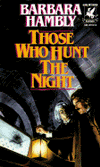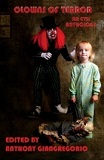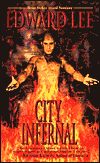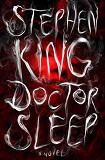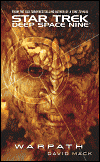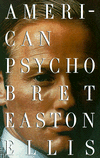
American Psycho, by Bret Easton Ellis
Book Review by Paul Kane
Have you read this book?
Now that the movie version of American Psycho has at last arrived, with the video out to rent in Britain, it seems like as good a time as any to go back and re-examine the book that caused all the fuss in the first place near enough ten years ago. So, is the story dated, stranded back in the late 80s/early 90s groove, or will its message be just as pertinent another ten years down the line? Are the contents really as outrageous as everyone remembers, or have they paled beside the fictional and celluloid excesses of recent years? These and many more crucial issues will be addressed after this little recap.
Pat Bateman has it all. Money, brains, power, prestige. As a slick twenty-seven-year-old investment banker on Wall St, his days are spent clinching deals and dining out at only the most expensive restaurants, before heading off to the latest 'hot spot' night-clubs to get high on booze and drugs. Women are falling over themselves to get into bed with him, a consequence of his perfect model looks and his taut, bronzed body - honed in a $5,000 a year members only health club. And yet this still isn't enough for him...
Because Patrick Bateman is also a psychopath, a ruthless maniac with no remorse. He idolises the serial killers of the past (favourite: Ted Bundy), but actually outdoes them in every respect. He gratifies himself by torturing his victims, often videotaping the sessions to play back again later, and thinks nothing of attacking innocent vagrants on the street just for the sheer hell of it. But the best thing about it is he lives in a city, in a society, that doesn't seem to care what he does. In spite of the massive hints he drops - filling in crossword puzzles with the phrase 'meat and bone' over and over, wearing a costume at Halloween that says 'Mass Murderer' on the back, even going as far as to describe what he'd like to do to people right in front of their faces - the penny never drops. The police never catch him, although they do happen upon him accidentally at one point, and not one woman has reservations about going back with him to his luxury apartment, alone.
But Bateman's condition is getting worse. His need to kill growing stronger by the minute as the fine line he walks between fantasy and reality rapidly disintegrates (park benches appear to be chasing him and he sees breakfast cereals being interviewed on TV talk shows). Will he ever be able to satisfy his bloodlust, or will the pace he's set for himself burn this American Psycho out?
A novel plagued by controversy from the very start, after one publishing house abandoned the book on the eve it was due to go on sale, AP has both enhanced and tarnished the reputation of its author in equal measure. Ellis will forever be associated with this one misunderstood, pivotal piece, for better or for worse - although he claims he didn't write it for the reaction: rather he did it for personal reasons, the depression he was battling with during the late 80s giving the novel an all-too real sense of danger.
Yes, the much criticised scenes of death and violence are still shocking today - infinitely more distressing than anything in a King or Herbert book (I even found myself flinching at particular passages, and that doesn't happen very often nowadays). They have all the consistency of a road traffic accident and subsequently have the same effect on the bystander: you want to look away, but a certain morbid curiosity compels you to read on ('I finally use a Bic lighter and hold it up to both sockets, making sure they stay open with my fingers...until the eyeballs burst.'). And yes, women are treated abysmally, the sex scenes almost pornographic in nature, their bodies merely toys for Bateman to play with and discard afterwards - even his old sweetheart from college doesn't escape...But this is not done just for the sake of it, and anyone who thinks that is missing the point. By taking us to the edge, Ellis simultaneously emphasises the indifference of these characters and the culture that spawned them, yet at the same time ensures that the reader never falls into this particular trap.
Conversations revolve around clothes with designer labels and oblique business deals (especially the elusive 'Fisher Account'), around food and drink, around The Patty Winters Show and pop bands (there are three chapters devoted entirely to Genesis, Whitney Houston and Huey Lewis), around hair and make-up...Ellis exposes the superficiality of the 80s 'yuppie' brigade in a scathingly satirical way, the black comedy as funny as the slayings are graphic. In fact you can't help thinking that a lot of Bateman's victims actually deserve their fate, so caught up in their own little worlds that they fail to see the blindingly obvious until it pounces on them.
As the author comments in the book, there is no key to who Bateman is (he is timeless), but there is a warning about making life easy for him and his kind, about fostering their obsessions. So much more than just Wall Street meets Henry, and so far removed from Hitchcock's take as to be laughable (Bateman - Bates? - even criticises that movie for its lack of realistic gore), the book is a lesson to us all. This is Paul Kane, wearing a two-buttoned wool suit with pleated trousers by Luciano Soprani, a cotton shirt by Brooks Brothers and a silk tie by Armani. Ciao!
Pat Bateman has it all. Money, brains, power, prestige. As a slick twenty-seven-year-old investment banker on Wall St, his days are spent clinching deals and dining out at only the most expensive restaurants, before heading off to the latest 'hot spot' night-clubs to get high on booze and drugs. Women are falling over themselves to get into bed with him, a consequence of his perfect model looks and his taut, bronzed body - honed in a $5,000 a year members only health club. And yet this still isn't enough for him...
Because Patrick Bateman is also a psychopath, a ruthless maniac with no remorse. He idolises the serial killers of the past (favourite: Ted Bundy), but actually outdoes them in every respect. He gratifies himself by torturing his victims, often videotaping the sessions to play back again later, and thinks nothing of attacking innocent vagrants on the street just for the sheer hell of it. But the best thing about it is he lives in a city, in a society, that doesn't seem to care what he does. In spite of the massive hints he drops - filling in crossword puzzles with the phrase 'meat and bone' over and over, wearing a costume at Halloween that says 'Mass Murderer' on the back, even going as far as to describe what he'd like to do to people right in front of their faces - the penny never drops. The police never catch him, although they do happen upon him accidentally at one point, and not one woman has reservations about going back with him to his luxury apartment, alone.
But Bateman's condition is getting worse. His need to kill growing stronger by the minute as the fine line he walks between fantasy and reality rapidly disintegrates (park benches appear to be chasing him and he sees breakfast cereals being interviewed on TV talk shows). Will he ever be able to satisfy his bloodlust, or will the pace he's set for himself burn this American Psycho out?
A novel plagued by controversy from the very start, after one publishing house abandoned the book on the eve it was due to go on sale, AP has both enhanced and tarnished the reputation of its author in equal measure. Ellis will forever be associated with this one misunderstood, pivotal piece, for better or for worse - although he claims he didn't write it for the reaction: rather he did it for personal reasons, the depression he was battling with during the late 80s giving the novel an all-too real sense of danger.
Yes, the much criticised scenes of death and violence are still shocking today - infinitely more distressing than anything in a King or Herbert book (I even found myself flinching at particular passages, and that doesn't happen very often nowadays). They have all the consistency of a road traffic accident and subsequently have the same effect on the bystander: you want to look away, but a certain morbid curiosity compels you to read on ('I finally use a Bic lighter and hold it up to both sockets, making sure they stay open with my fingers...until the eyeballs burst.'). And yes, women are treated abysmally, the sex scenes almost pornographic in nature, their bodies merely toys for Bateman to play with and discard afterwards - even his old sweetheart from college doesn't escape...But this is not done just for the sake of it, and anyone who thinks that is missing the point. By taking us to the edge, Ellis simultaneously emphasises the indifference of these characters and the culture that spawned them, yet at the same time ensures that the reader never falls into this particular trap.
Conversations revolve around clothes with designer labels and oblique business deals (especially the elusive 'Fisher Account'), around food and drink, around The Patty Winters Show and pop bands (there are three chapters devoted entirely to Genesis, Whitney Houston and Huey Lewis), around hair and make-up...Ellis exposes the superficiality of the 80s 'yuppie' brigade in a scathingly satirical way, the black comedy as funny as the slayings are graphic. In fact you can't help thinking that a lot of Bateman's victims actually deserve their fate, so caught up in their own little worlds that they fail to see the blindingly obvious until it pounces on them.
As the author comments in the book, there is no key to who Bateman is (he is timeless), but there is a warning about making life easy for him and his kind, about fostering their obsessions. So much more than just Wall Street meets Henry, and so far removed from Hitchcock's take as to be laughable (Bateman - Bates? - even criticises that movie for its lack of realistic gore), the book is a lesson to us all. This is Paul Kane, wearing a two-buttoned wool suit with pleated trousers by Luciano Soprani, a cotton shirt by Brooks Brothers and a silk tie by Armani. Ciao!
| American Psycho, by Bret Easton Ellis on Amazon |
American Psycho, by Bret Easton Ellis on Amazon

| More Books You Might Like |
Comment on American Psycho, by Bret Easton Ellis
